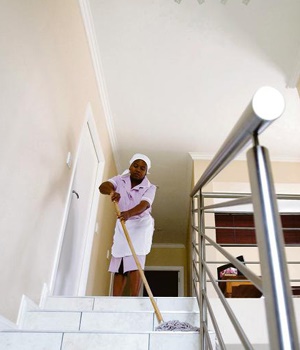
Start-up company SouthSweep, a local home-cleaning service, is revolutionising the market
An Uber-like service for domestic workers is gaining ground in some of South Africa’s major middle class nodes, heralding changes to the country’s largest form of employment.
Home-cleaning company SweepSouth this week announced new financial backing of R10 million from the Vumela Fund and venture capital firm Newtown Partners. Vumela is jointly capitalised by FNB and the state’s Jobs Fund.
SweepSouth is still tiny compared with the institution of domestic work, with roughly 1 million people working in other people’s homes, according to Stats SA’s Labour Force Survey.
Wife-and-husband team Aisha Pandor and Alen Ribic founded SweepSouth 18 months ago and have “a few hundred” active cleaners registered, with more in the queue for their vetting process.
The company, however, represents one of the early attempts to bring the so-called sharing economy into traditional low-wage service industries.
Pandor, who is also CEO of SweepSouth, says the client base amounts to “thousands”, mostly concentrated in a few “middle class hot spots”. “There is definitely a concentration of the clientele,” says Pandor.
In Cape Town, SweepSouth sees most of its business emanating from the affluent southern suburbs and the City Bowl. In Johannesburg, it is mostly in Sandton and Randburg.
The workforce is likewise concentrated in neighbouring townships like Tembisa or Alexandra in Johannesburg, or Gugulethu, Khayelitsha and the informal settlements of Hout Bay in Cape Town, she says.
SweepSouth’s rate is R38 per hour, of which the worker keeps about R30. This was decided on after surveying clients and workers, and deriving an average rate across several cities. Cities like Bloemfontein have lower wages than Cape Town or Johannesburg.
If someone works a five-day week, eight hours a day, they would make just over R5 000 in a month. Pandor says “most” workers using the service work the equivalent of full time this way.
The current statutory minimum wage for domestic work in metro areas is R13.39 per hour.
According to Pandor, 90% of applicants do not make it on to the service. To get in you need two years’ experience cleaning houses, she says.
Another hurdle is the need to be “presentable”, which mostly boils down to speaking English. The client base is overwhelmingly English speaking and the service itself is in English, she explains.
After that, applicants get interviewed, screened for criminal records and put through a “cleaning test” to gauge their knowledge.
While the controversy around the taxi service Uber has to do with its displacing older taxi companies, SweepSouth is introducing the model into the almost entirely informal sector of domestic work.
Domestic work has been largely impervious to past attempts to formalise it or to organise workers, but services like SouthSweep could in time lead to a kind of centralisation.
Like Uber, SweepSouth strenuously avoids the word ‘employee’. According to Pandor, we “need to change our mind-set about work”. She adds that the answer may or may not be a new legal definition for workers in systems like SweepSouth.
They lie somewhere “between traditional permanent work and piecework with no protection”.
This is the major challenge Uber faces in its birthplace in California, where a class action is in the works concerning whether Uber drivers are, in fact, legally employees of the company – based on the fact that the company in effect determines conditions of employment.
“We are setting the wage rate, so we are answerable for that,” says Pandor.
The company has only been fully up and running for a year, and still has to devise how it will deal with increasing the rates over time. “We think differently from a labour broker,” says Pandor.
If people negotiate jobs with clients on SouthSweep and then leave, “that’s fantastic”.
“We don’t want to displace permanent work.”
The clientele consists largely of people who do not already employ domestic workers and really just want the service on an “ad hoc” basis, says Pandor.
The age-old institution of domestic labour has been undergoing changes. The most glaring is the shift in the age profile of domestic workers.
Between 2009 and 2014, the number of people younger than 40 doing domestic work has declined by 17% – leaving more than 60% of people over the age of 40 doing domestic work. Pandor says cleaners on their books are in their late twenties and thirties.
You find that about 60% of applicants are South African, says Pandor.
The workers on the service use public transport and each one has to specify an area they can serve.
Clients need to provide the chemicals and equipment.
You also need a basic smartphone and a bank account as the service works on the same non-cash basis as Uber.
Workers get paid for their hours at the end of the week.




 Publications
Publications
 Partners
Partners








